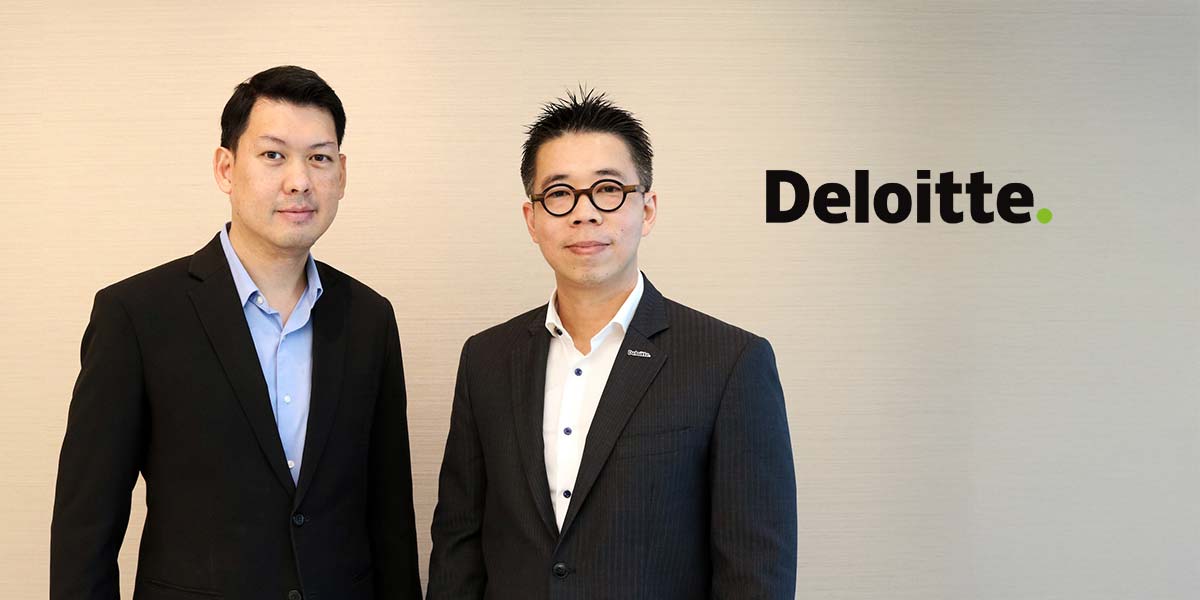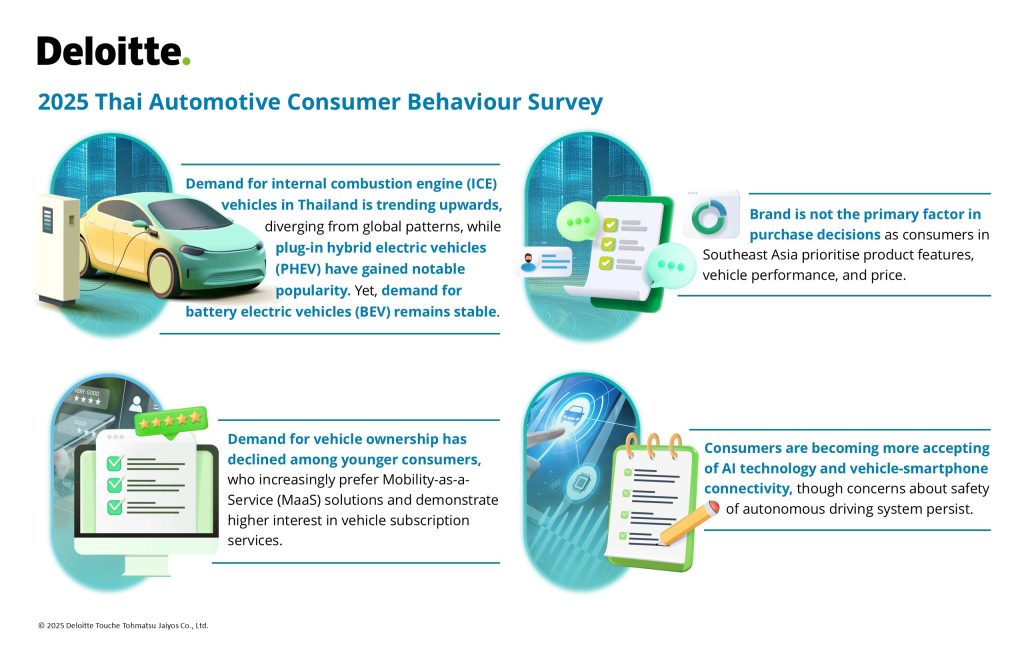- Deloitte’s report indicates that demand for internal combustion engine (ICE) vehicles in Thailand is trending upwards, diverging from global patterns, while plug-in hybrid electric vehicles (PHEV) have gained notable popularity. Yet, demand for battery electric vehicles (BEV) remains stable.
- Brand is not the primary factor in purchase decisions as consumers in Southeast Asia prioritise product features, vehicle performance and price.
- Demand for vehicle ownership has declined among younger consumers, who increasingly prefer Mobility-as-a-Service (MaaS) solutions and demonstrate higher interest in vehicle subscription services.
- Consumers are becoming more accepting of AI technology and vehicle-smartphone connectivity, though concerns about safety of autonomous driving system persist.
Deloitte Thailand released the latest 2025 Global Automotive Consumer Study: Southeast Asia Perspectives report, which surveyed 6,029 consumers across six Southeast Asian countries, including more than 1,000 in Thailand. The findings reveal fascinating behaviours among Thai consumers that diverge from several global trends, particularly the increased demand for internal combustion engine (ICE) vehicles amid changes to brand loyalty.
Additionally, the survey identified unique consumer characteristics in Thailand, with respondents putting greater trust in vehicle dealers than car manufacturers when it comes to car data management. These findings highlight both challenges and opportunities for automotive ecosystem stakeholders, who must adapt their strategies to meet increasingly complex consumer demands.
Consumer Preferences Bucking the EV Trend
While the automotive industry is shifting towards electric vehicles (EV), survey results indicate that Southeast Asian consumers continue to favour ICE vehicles, with year-on-year increases in most markets across the region.
In Thailand specifically, ICE demand rose from 32 percent to 36 percent. Notably, the popularity of plug-in hybrid electric vehicle (PHEV) increased significantly from 17 percent to 21 percent, reflecting Thai consumers’ preference for flexible solutions that address practical usage requirements.
The report also highlights concerns about EV adoption in Thailand, such as cost, driving range and time required to charge. In Thailand, concerns about the scarcity of on-street or public charging stations decreased substantially from 46 percent last year to just 26 percent this year, potentially reflecting increased confidence in the country’s expanding charging infrastructure.
Furthermore, 46 percent of Thai consumers—the highest proportion in the region—expect charging from zero to 80 percent battery power to take no more than 20 minutes.
Quality and Performance Over Brand Recognition
The survey also reveals that brand loyalty is changing. Among Thai respondents, 43 percent indicated that their prior vehicle was from the same brand as their current vehicle. Yet, when asked about their next vehicle purchase, 67 percent of Thai respondents indicated that they intend to switch to another brand.
This aligns with regional trends, where 70 percent of consumers demonstrate an increased willingness to explore new alternatives. The three most influential factors that Thai consumers prioritise are product features, vehicle performance and price.
Brand image and familiarity ranked fifth and sixth respectively in purchase decision criteria. These findings indicate that today’s consumers base their purchasing decisions on tangible vehicle value propositions rather than traditional brand considerations.
Evolving Expectations and New Roles for Dealers
The survey reveals a sharp decline in the desire for in-person showroom visits, with 73 percent of respondents preferring to limit their visits to car dealerships, up from just 36 percent last year.
Meanwhile, 93 percent of consumers indicate that they must physically interact with vehicles before purchasing them, and 90 percent require test drives. This reflects demand for seamless hybrid purchasing experiences bridging online and offline worlds.
In addition, compared to the region, Thai consumers place the highest importance on domestically manufactured vehicles, with 71 percent considering this a crucial purchasing factor, reflecting confidence in the quality of Thai automotive manufacturing.
Notably, the survey also found that Thai consumers place the greatest trust in automotive dealers for vehicle data management, emphasising the critical role of vehicle dealer networks in Thailand’s market, which differs from other regional countries that place more trust in car manufacturers.
Practical Usage Patterns and Electric Vehicle Expectations
The survey provides a glimpse into vehicle usage patterns in Thailand, with nearly half (48 percent) of respondents reporting that they drive more than 100 kilometres on at least five occasions each month, and 49 percent using their personal vehicles daily. These patterns underscore the need for high-performing, reliable vehicles to support the demands of Thai consumers.
When it comes to expectations for battery electric vehicles (BEVs), 40 percent of Thai consumers expect a driving range of more than 400 kilometres per charge. Key factors in EV charging include fast charging time as the highest priority (22 percent), followed by personal safety (15 percent) and convenience and accessibility (15 percent).
MaaS and Subscription Services Gaining Momentum
Among younger consumers aged 18-34 years old, the survey reveals a clear trend towards reduced interest in vehicle ownership, with many diversifying their vehicle ownership models to better suit their needs, such as through Mobility-as-a-Service (MaaS) solutions.
Consumers in Thailand rank third regionally (55 percent) in being willing to give up vehicle ownership in favour of MaaS – after Vietnam (67 percent) and Indonesia (58 percent). Along a similar vein, younger consumers’ interest in the MaaS service aligns with increased interest in giving up vehicle ownership in favour of vehicle subscription, with Thailand ranking second regionally (49 percent) after Vietnam (66 percent).
Technology and Trust Dynamics
Southeast Asian consumers broadly embrace convenience-enhancing automotive technologies. Thai consumers (75 percent) view the addition of artificial intelligence in vehicle systems as beneficial, the third highest percentage after Vietnam (84 percent) and Indonesia (78 percent).
Similarly, the ability to connect with smartphones is highly popular, with 74 percent of Thai consumers finding it important. However, consumers in Southeast Asia are concerned about how future technologies will play a role in directly controlling driving functions.
The survey found that nearly half of regional consumers, including 39 percent in Thailand, remain concerned about fully autonomous robotaxi services operating where they live. Concerns intensify for commercial vehicles operating in fully autonomous mode on highways, with 64 percent of Thai consumers expressing this sentiment, despite the fact that neither self-driving robotaxis nor autonomous commercial vehicles on highways are currently operating in the region.
“The automotive industry is a large-scale industry with complex and deeply rooted ecosystems. Once transformation takes hold, the impact will be significant and long-lasting. As such, adaptation efforts must prioritise consumer perspectives, demands and readiness as fundamental considerations. However, consumer behaviour is rapidly evolving, with buyers beginning to view vehicles not merely as long-term investment assets but as products that must address their current needs while accommodating frequent lifestyle changes. This signals a future where automobiles may increasingly transform into Fast-Moving Consumer Goods (FMCG), characterised by rapid consumption and turnover cycles,” said Seongjin Lee, Automotive Sector Leader, Deloitte Southeast Asia.
“While the current landscape of the automotive industry, particularly in Thailand, may seem more subdued than before, it is important to recognise the ongoing transformations taking place. These changes bring about not just challenges but also present compelling new opportunities for businesses and industry stakeholders. Embracing such opportunities will drive growth and competitive capabilities in this rapidly evolving marketplace,” added Mongkol Somphol, Automotive Sector Leader, Deloitte Thailand.
“Consumers have demonstrated greater sensitivity and adaptability than anticipated. Therefore, presenting comprehensive products and services that address consumer needs may prove to be a safer approach than pursuing extreme development focused solely on a single dimension,” concluded Chodok Panyavarananth, PhD, Senior Manager, Growth, Deloitte Thailand.






